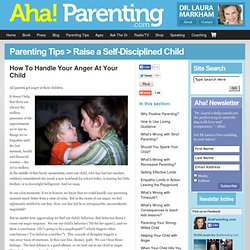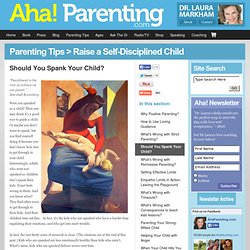

How To Handle Your Anger At Your Child. All parents get angry at their children.

It doesn’t help that there are always the endless pressures of life: appointments we’re late to, things we’ve forgotten until the last moment, health and financial worries -- the list is endless. In the middle of that hectic momentum, enter our child, who has lost her sneaker, suddenly remembered she needs a new notebook for school today, is teasing her little brother, or is downright belligerent. And we snap. In our calm moments, if we’re honest, we know that we could handle any parenting moment much better from a state of calm.
But in the storm of our anger, we feel righteously entitled to our fury. But no matter how aggravating we find our child's behavior, that behavior doesn't cause our angry response. Your child may be pushing your buttons, but he isn't causing your response. WHY We Get So Angry At Our Kids Parents and kids have the ability to trigger each other as no one else can. What Happens to Your Child When You Scream or Hit 1. 2. 3. 4. Gentle Discipline Mothering Mag. Hand in Hand Parenting. Should You Spank Your Child? “Punishment is the root of violence on our planet.” - Marshall Rosenberg Were you spanked as a child?

Then you may think it's a good way to guide a child. Or maybe you don't want to spank, but you find yourself doing it because you don't know how else to get through to your child. Interestingly, adults who were not spanked as children don't spank their kids. It just feels wrong to them. In fact, the last thirty years of research is clear. So if you were spanked and think you came out alright, it wasn't because of the spanking. A 2013 study by Elizabeth Gershoff and her team (cited below) reviewed the previous two decades of research and confirmed that children who are spanked have less gray matter in their brains, and are more likely to exhibit depression, anxiety, drug use, and aggression as they get older.
Large, peer-reviewed studies repeatedly show that the more children are hit, the more likely they are to hit others, including peers and siblings. Crystal Lutton: Gershoff, E. » Testing the Boundaries~What’s A Parent To Do? Little Hearts/Gentle Parenting Resources. Challenging behavior in our children can be really…well, challenging! How do you ‘handle’ a child who suddenly refuses to wear shoes or sit in her carseat/seatbelt or eat, period? Here are some tips to help you regain that snuggly, loving relationship you used to enjoy before your baby became a… …PERSON! 1.) Remove the word ‘handle’ from your parenting vocabulary entirely. Your child isn’t a lion to be tamed or a dog to be trained! 2.) 3.) 4.) 5.) 6.) Here are some ideas for your Gentle Parenting toolbox: Little one refusing to put on shoes before leaving the house?
If a tantrum results, remember to stay calm (deep breathing, counting silently, and saying a quick prayer for guidance are all helpful!)